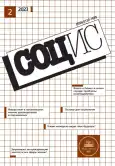Factors Of Students Involvement In Destructive Practices In Real And Digital Spase
- 作者: Shumkova N.V.1, Dadaeva T.M.1
-
隶属关系:
- National Research Mordovian State University of N. P. Ogarev
- 期: 编号 2 (2023)
- 页面: 137-142
- 栏目: Articles
- URL: https://rjsvd.com/0132-1625/article/view/661551
- DOI: https://doi.org/10.31857/S013216250023446-3
- ID: 661551
如何引用文章
详细
The study is based on the data of a students’ sociological survey the attitude to destructive practices. The influence of factors – agents of socialization – as family, classmates, social networks on involvement in destructive practices is proved. The authors using cluster analysis, attempted to determine the "risk group" among students based on the following indicators: level of communication and control in the family, level of communication and integration in the student group, level of communication and involvement in social networks. It is concluded that the degree of involvement in the space of virtual destructions differs significantly depending on the level of student’s involvement in destructive practices. Respondents from the “risk group” more often demonstrated a low level of communication and control in the family, more often noted the involvement of close friends in destructive practices, poor integration and communication in student groups, spending much time on social networks more often encountering destructive content there, in general have a high level of social isolation, manifesting in certain circumstances in hidden destructive aggression both against oneself and against others.
全文:
作者简介
Nataliya Shumkova
National Research Mordovian State University of N. P. Ogarev
Email: socis@isras.ru
俄罗斯联邦, Saranck
Tatiana Dadaeva
National Research Mordovian State University of N. P. Ogarev
编辑信件的主要联系方式.
Email: socis@isras.ru
俄罗斯联邦
参考
- Ivanov A.V. (2020) Virtual destructivity and social space: to the statement of the problem (on the materials of field studies of ideology "columbine"). Kazanskiy pedagogicheskiy zhurnal [Kazan Teaching Journal]. No. 4: 274–279. doi: 10.34772/KPJ.2020.141.4.039. (In Russ.)
- Karpova A.Y., Savelev A.O., Vilnin A.D., Chaykovskiy D.V. (2020) Studying Online Radicalization of Youth through Social Media (Interdisciplinary Approach). Monitoring obshchestvennogo mneniya: ekonomicheskiye i sotsial'nyye peremeny [Monitoring of Public Opinion: Economic and Social Changes]. No. 3: 159–181. doi: 10.14515/monitoring.2020.3.158. (In Russ.)
- Kozlov V., Mingaliev A. (2020) The problem of scientific representation of modern youth subcultures: from methodology to narrative. Kazanskiy pedagogicheskiy zhurnal [Kazan Teaching Journal]. No.1: 255–262. doi: 10.34772/KPJ.2020.138.1.038. (In Russ.)
- Sobkin V.S., Fedotova A.V. (2019) Social Media as a Field of a Modern Teenager’s Socialization [Elektronnyi resurs]. Konsul'tativnaya psikhologiya i psikhoterapiya [Counseling Psychology and Psychotherapy]. Vol. 27. No. 3: 119–137. doi: 10.17759/cpp.2019270308. (In Russ.)
补充文件









